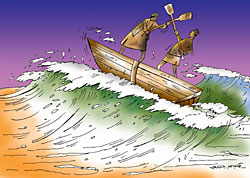 When an experienced foreign 'Nepal hand' recently left the country, he took with him his inside knowledge of all that ails us now. Another influential foreigner who has acquired in-depth knowledge will be leaving soon, and with him will go another store of expertise. Both will be replaced by newcomers who will, naturally, take months or even years to pick up Nepal's subtleties and nuances, wherein hide its truths. Meanwhile, it will fall on their Nepali contacts to educate them.
When an experienced foreign 'Nepal hand' recently left the country, he took with him his inside knowledge of all that ails us now. Another influential foreigner who has acquired in-depth knowledge will be leaving soon, and with him will go another store of expertise. Both will be replaced by newcomers who will, naturally, take months or even years to pick up Nepal's subtleties and nuances, wherein hide its truths. Meanwhile, it will fall on their Nepali contacts to educate them. Nepalis with some (even limited) relations with the international community in Nepal are often obliged to explain their country to confused 'experts,' going over obscure events from decades or even centuries ago, examining any number of social issues, decoding the mysteries of current politics. Of course, outsiders will turn to insiders for insight: and insiders often enjoy sharing their wisdom. The problem is, many foreigners in Nepal's international community seem to rely more on cocktail hour chatter than on in-depth study to learn about this country, where they wield great influence.
Recently, an aid industry consultant who has worked here for more than six years remarked that she had not read more than a bare sketch of Nepal's history. "In no other country where I've worked would I be allowed to do that," she admitted. "Here, the development sector has no historical memory. There is no compulsion for us to understand the past."
To be fair, most Nepalis also have a poor sense of history. The reason? Only in 1990 were we freed from the Panchayat era's flat, propagandistic 'Ode to the Shahs' version of our past. Only since then have we begun to discover, for real, who we have been and who we are now.
The histories of our dissidents, for example, is only just being written. Because the political parties were underground, many Nepalis are only now learning about what they have done. Women, dalits and janajatis have yet to write themselves into our history. And new facts about Nepal are emerging every day. New perspectives are opening up. Are we brave Gurkha soldiers or exploited mercenaries? We don't know. Should women really be equal to men? We are not sure. Are the Khadkis a dalit caste or not? That's up for debate. What is the economic status of the Chepangs as compared to the Chettris? It's anyone's guess. The fact is, we are only now coming into definition as a country.
The intellectual ferment of our times is not obvious to the newcomer to Nepal. What is obvious is the day-to-day muddle of a country undergoing immense social and political transformation.
This muddle must be catching; for it is visible everywhere in Kathmandu's diplomatic and aid sectors. One glaring example: the weird, willful optimism in the international community when King Gyanendra took over in October 2003. Despite publicly committing to democracy, in private most diplomats and aid workers were sighing in relief, and even, cautiously, celebrating. "What better option is there?" went the cocktail hour chatter of the day.
The better option, of course, was to place the king's takeover in historical perspective, seeing it as an aberrant blip in the ongoing struggle to establish democracy in Nepal. Nepal's political enlightenment came thanks primarily to the dissidents of the 1930s and 1940s. Had the political parties not liberated the country from Rana rule in 1950, we would not have awakened to our rights. The underground activism of the 1970s and 1980s, and the 1990 people's movement unleashed ever-expanding drives for liberty and equality. Without the political parties that the international community so loves to disparage, there would be no women's movement in Nepal, no dalit movement, no janajati movement. There would be no unions, associations or forums to address public grievances.
If foreign 'Nepal hands' were properly educated about Nepal's past, they would be more sympathetic to the political parties, despite the parties' inexperience. After all, less than 15 years of Nepali history have been spent on the exercise of democracy: give it 20 years, democracy will work out its kinks. Lacking this historical perspective, influential foreigners here get derailed by cocktail hour chatter and the slapped-together pseudo-scholarship of such geniuses (not) as Robert Gersony. They throw their weight behind the anachronistic, the abhorred; and are shocked to realize, too late, that the majority of Nepalis are elsewhere.
There is no polite way to say this. It would greatly help Nepal if influential foreigners here would read, read, read-not just newspapers. Actual books. And if there aren't enough good books around, then support the intellectual ferment gathering force today: invest in new scholarships.



